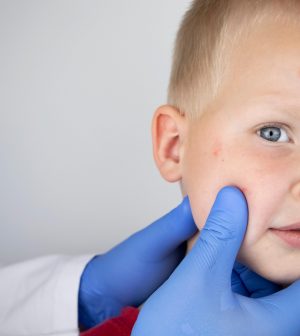- Could Your Grocery Store Meat Be Causing Recurring UTIs?
- Are You Making This Expensive Thermostat Error This Winter?
- Recognizing the Signs of Hypothyroidism
- 10 Strategies to Overcome Insomnia
- Could Artificial Sweeteners Be Aging the Brain Faster?
- Techniques for Soothing Your Nervous System
- Does the Water in Your House Smell Funny? Here’s Why
- Can a Daily Dose of Apple Cider Vinegar Actually Aid Weight Loss?
- 6 Health Beverages That Can Actually Spike Your Blood Sugar
- Treatment Options for Social Anxiety Disorder
Measles Outbreak in Ohio Declared Over After 85 Cases

MONDAY, Feb. 6, 2023 (HealthDay News) – A central Ohio measles outbreak among children who were not fully vaccinated is now over, public health officials announced Saturday.
Columbus Health declared the outbreak finished with no new cases after a period of 42 days — the equivalent of two measles virus incubation periods.
In all, 85 children were known to be infected in the outbreak, including 36 who were hospitalized, city health department data shows. All but five of the children were 5 and younger. None of the children died.
“We’ve had low vaccination rates for MMR in our community for years, but we’ve never had a measles outbreak like we have now. So, it did take us by surprise,” Dr. Mysheika Roberts, health commissioner for the city of Columbus, told CNN.
Cases were initially reported in November and early December.
Health officials said they began “sounding the alarm” early to fight the outbreak. They provided information about the virus’ ability to spread easily, and they promoted the importance of getting young children vaccinated against the virus, Roberts said.
“In addition, we’ve had family members of individuals who have been infected with measles who have been very vocal and said they made a mistake — they should have gotten their child vaccinated. And I think that has helped as well,” Roberts added.
In central Ohio, the outbreak spread in small pockets of families that had opted out of vaccinating their kids, CNN reported.
They were influenced by “false information that was distributed about the MMR vaccine being associated with autism,” Roberts explained.
In those who are unvaccinated, about 90% of those exposed will become infected, according to Columbus Public Health. About 20% of those who become infected with measles will be hospitalized, CNN reported.
Despite the spread misinformation, about 90% of U.S. children are still vaccinated against measles, mumps and rubella by age 2, according to the U.S. Centers for Disease Control and Prevention.
It’s recommended that children received the MMR vaccine in two doses. The first is delivered between 12 and 15 months and the second between ages 4 and 6. That first dose is about 93% effective, and the second brings effectiveness to 97%, CNN reported.
The measles virus spreads when an infected person coughs or sneezes or shares germs on surfaces, and it can live in the air for up to two hours. Although measles was declared eliminated in the United States in 2000, it sometimes emerges in communities with low vaccination rates.
Symptoms are fever, cough, runny nose, watery eyes and a rash of red spots. Rarely, it can lead to pneumonia, encephalitis or death, CNN reported.
“While we expect importations of measles cases into the United States to continue, the risk for measles for the majority of the population would still remain low,” according to the CDC. “That is because most people in the United States are vaccinated against measles.”
More information
The World Health Organization has more on measles.
SOURCE: CNN
Source: HealthDay
Copyright © 2026 HealthDay. All rights reserved.










